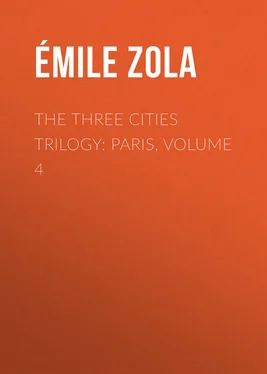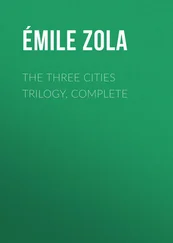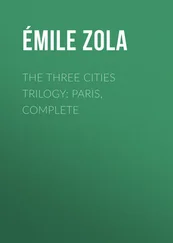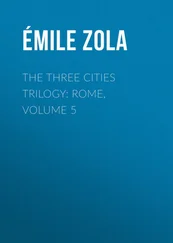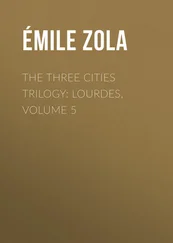Émile Zola - The Three Cities Trilogy - Paris, Volume 4
Здесь есть возможность читать онлайн «Émile Zola - The Three Cities Trilogy - Paris, Volume 4» — ознакомительный отрывок электронной книги совершенно бесплатно, а после прочтения отрывка купить полную версию. В некоторых случаях можно слушать аудио, скачать через торрент в формате fb2 и присутствует краткое содержание. Жанр: literature_19, foreign_antique, foreign_prose, на английском языке. Описание произведения, (предисловие) а так же отзывы посетителей доступны на портале библиотеки ЛибКат.
- Название:The Three Cities Trilogy: Paris, Volume 4
- Автор:
- Жанр:
- Год:неизвестен
- ISBN:нет данных
- Рейтинг книги:3 / 5. Голосов: 1
-
Избранное:Добавить в избранное
- Отзывы:
-
Ваша оценка:
- 60
- 1
- 2
- 3
- 4
- 5
The Three Cities Trilogy: Paris, Volume 4: краткое содержание, описание и аннотация
Предлагаем к чтению аннотацию, описание, краткое содержание или предисловие (зависит от того, что написал сам автор книги «The Three Cities Trilogy: Paris, Volume 4»). Если вы не нашли необходимую информацию о книге — напишите в комментариях, мы постараемся отыскать её.
The Three Cities Trilogy: Paris, Volume 4 — читать онлайн ознакомительный отрывок
Ниже представлен текст книги, разбитый по страницам. Система сохранения места последней прочитанной страницы, позволяет с удобством читать онлайн бесплатно книгу «The Three Cities Trilogy: Paris, Volume 4», без необходимости каждый раз заново искать на чём Вы остановились. Поставьте закладку, и сможете в любой момент перейти на страницу, на которой закончили чтение.
Интервал:
Закладка:
Pierre, at sight of it, put his fancy into words: "It is the sun sowing Paris with grain for a future harvest," said he. "See how the expanse looks like ploughed land; the brownish houses are like soil turned up, and the streets are deep and straight like furrows."
"Yes, yes, that's true," exclaimed Marie gaily. "The sun is sowing Paris with grain. See how it casts the seed of light and health right away to the distant suburbs! And yet, how singular! The rich districts on the west seem steeped in a ruddy mist, whilst the good seed falls in golden dust over the left bank and the populous districts eastward. It is there, is it not, that the crop will spring up?"
They had all drawn near, and were smiling at the symbol. As Marie had said, it seemed indeed that while the sun slowly sank behind the lacework of clouds, the sower of eternal life scattered his flaming seed with a rhythmical swing of the arm, ever selecting the districts of toil and effort. One dazzling handful of grain fell over yonder on the district of the schools; and then yet another rained down to fertilise the district of the factories and work-shops.
"Ah! well," said Guillaume gaily. "May the crop soon sprout from the good ground of our great Paris, which has been turned up by so many revolutions, and enriched by the blood of so many workers! It is the only ground in the world where Ideas can germinate and bloom. Yes, yes, Pierre is quite right, it is the sun sowing Paris with the seed of the future world, which can sprout only up here!"
Then Thomas, Francois and Antoine, who stood behind their father in a row, nodded as if to say that this was also their own conviction; whilst Mere-Grand gazed afar with dreamy eyes as though she could already behold the splendid future.
"Ah! but it is only a dream; centuries must elapse. We shall never see it!" murmured Pierre with a quiver.
"But others will!" cried Marie. "And does not that suffice?"
Those lofty words stirred Pierre to the depths of his being. And all at once there came to him the memory of another Marie 1 1 The heroine of M. Zola's "Lourdes."
– the adorable Marie of his youth, that Marie de Guersaint who had been cured at Lourdes, and the loss of whom had left such a void in his heart. Was that new Marie who stood there smiling at him, so tranquil and so charming in her strength, destined to heal that old-time wound? He felt that he was beginning to live again since she had become his friend.
Meantime, there before them, the glorious sun, with the sweep of its rays, was scattering living golden dust over Paris, still and ever sowing the great future harvest of justice and of truth.
II
TOWARDS LIFE
ONE evening, at the close of a good day's work, Pierre, who was helping Thomas, suddenly caught his foot in the skirt of his cassock and narrowly escaped falling. At this, Marie, after raising a faint cry of anxiety, exclaimed: "Why don't you take it off?"
There was no malice in her inquiry. She simply looked upon the priestly robe as something too heavy and cumbersome, particularly when one had certain work to perform. Nevertheless, her words deeply impressed Pierre, and he could not forget them. When he was at home in the evening and repeated them to himself they gradually threw him into feverish agitation. Why, indeed, had he not divested himself of that cassock, which weighed so heavily and painfully on his shoulders? Then a frightful struggle began within him, and he spent a terrible, sleepless night, again a prey to all his former torments.
At first sight it seemed a very simple matter that he should cast his priestly gown aside, for had he not ceased to discharge any priestly office? He had not said mass for some time past, and this surely meant renunciation of the priesthood. Nevertheless, so long as he retained his gown it was possible that he might some day say mass again, whereas if he cast it aside he would, as it were, strip himself, quit the priesthood entirely, without possibility of return. It was a terrible step to take, one that would prove irrevocable; and thus he paced his room for hours, in great anguish of mind.
He had formerly indulged in a superb dream. Whilst believing nothing himself he had resolved to watch, in all loyalty, over the belief of others. He would not so lower himself as to forswear his vows, he would be no base renegade, but however great the torments of the void he felt within him he would remain the minister of man's illusions respecting the Divinity. And it was by reason of his conduct in this respect that he had ended by being venerated as a saint – he who denied everything, who had become a mere empty sepulchre. For a long time his falsehood had never disturbed him, but it now brought him acute suffering. It seemed to him that he would be acting in the vilest manner if he delayed placing his life in accord with his opinions. The thought of it all quite rent his heart.
The question was a very clear one. By what right did he remain the minister of a religion in which he no longer believed? Did not elementary honesty require that he should quit a Church in which he denied the presence of the Divinity? He regarded the dogmas of that Church as puerile errors, and yet he persisted in teaching them as if they were eternal truths. Base work it was, that alarmed his conscience. He vainly sought the feverish glow of charity and martyrdom which had led him to offer himself as a sacrifice, willing to suffer all the torture of doubt and to find his own life lost and ravaged, provided that he might yet afford the relief of hope to the lowly. Truth and nature, no doubt, had already regained too much ascendancy over him for those feelings to return. The thought of such a lying apostolate now wounded him; he no longer had the hypocritical courage to call the Divinity down upon the believers kneeling before him, when he was convinced that the Divinity would not descend. Thus all the past was swept away; there remained nothing of the sublime pastoral part he would once have liked to play, that supreme gift of himself which lay in stubborn adherence to the rules of the Church, and such devotion to faith as to endure in silence the torture of having lost it.
What must Marie think of his prolonged falsehood, he wondered, and thereupon he seemed to hear her words again: "Why not take your cassock off?" His conscience bled as if those words were a stab. What contempt must she not feel for him, she who was so upright, so high-minded? Every scattered blame, every covert criticism directed against his conduct, seemed to find embodiment in her. It now sufficed that she should condemn him, and he at once felt guilty. At the same time she had never voiced her disapproval to him, in all probability because she did not think she had any right to intervene in a struggle of conscience. The superb calmness and healthiness which she displayed still astonished him. He himself was ever haunted and tortured by thoughts of the unknown, of what the morrow of death might have in store for one; but although he had studied and watched her for days together, he had never seen her give a sign of doubt or distress. This exemption from such sufferings as his own was due, said she, to the fact that she gave all her gaiety, all her energy, all her sense of duty, to the task of living, in such wise that life itself proved a sufficiency, and no time was left for mere fancies to terrify and stultify her. Well, then, since she with her air of quiet strength had asked him why he did not take off his cassock, he would take it off – yes, he would divest himself of that robe which seemed to burn and weigh him down.
He fancied himself calmed by this decision, and towards morning threw himself upon his bed; but all at once a stifling sensation, a renewal of his abominable anguish, brought him to his feet again. No, no, he could not divest himself of that gown which clung so tightly to his flesh. His skin would come away with his cloth, his whole being would be lacerated! Is not the mark of priesthood an indelible one, does it not brand the priest for ever, and differentiate him from the flock? Even should he tear off his gown with his skin, he would remain a priest, an object of scandal and shame, awkward and impotent, shut off from the life of other men. And so why tear it off, since he would still and ever remain in prison, and a fruitful life of work in the broad sunlight was no longer within his reach? He, indeed, fancied himself irremediably stricken with impotence. Thus he was unable to come to any decision, and when he returned to Montmartre two days later he had again relapsed into a state of torment.
Читать дальшеИнтервал:
Закладка:
Похожие книги на «The Three Cities Trilogy: Paris, Volume 4»
Представляем Вашему вниманию похожие книги на «The Three Cities Trilogy: Paris, Volume 4» списком для выбора. Мы отобрали схожую по названию и смыслу литературу в надежде предоставить читателям больше вариантов отыскать новые, интересные, ещё непрочитанные произведения.
Обсуждение, отзывы о книге «The Three Cities Trilogy: Paris, Volume 4» и просто собственные мнения читателей. Оставьте ваши комментарии, напишите, что Вы думаете о произведении, его смысле или главных героях. Укажите что конкретно понравилось, а что нет, и почему Вы так считаете.
